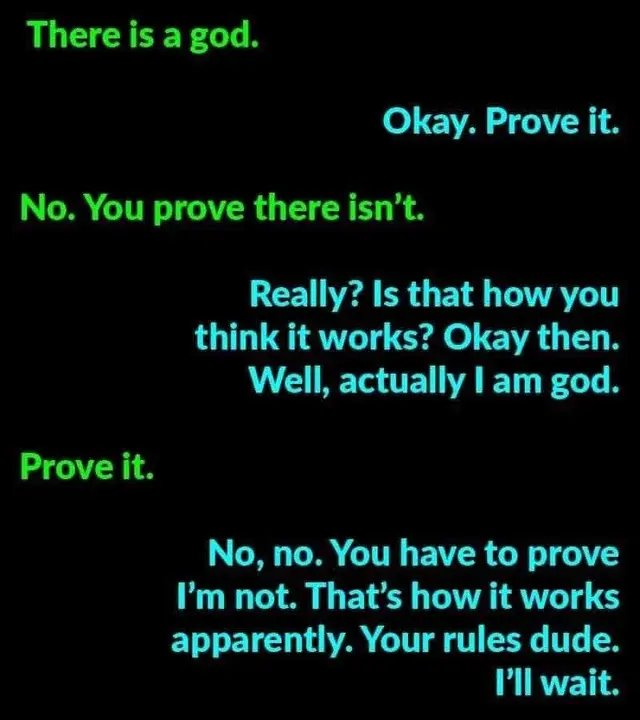this post was submitted on 07 Aug 2023
483 points (91.4% liked)
Atheist Memes
5549 readers
1150 users here now
About
A community for the most based memes from atheists, agnostics, antitheists, and skeptics.
Rules
-
No Pro-Religious or Anti-Atheist Content.
-
No Unrelated Content. All posts must be memes related to the topic of atheism and/or religion.
-
No bigotry.
-
Attack ideas not people.
-
Spammers and trolls will be instantly banned no exceptions.
-
No False Reporting
-
NSFW posts must be marked as such.
Resources
International Suicide Hotlines
Non Religious Organizations
Freedom From Religion Foundation
Ex-theist Communities
Other Similar Communities
!religiouscringe@midwest.social
founded 1 year ago
MODERATORS
you are viewing a single comment's thread
view the rest of the comments
view the rest of the comments

Im not saying there is a god and im not saying there isnt one, but this Post is quite misleading. The question of how to find truth is sadly not possible to answer, so both inductive and deductive reasong are perfectly reasonable. So this constructed dialogue is in no way an argument for atheism.
It sounds like - and correct me if I'm wrong - you're defining "atheism" as "the positive assertion that no gods exist." This is vastly different from what most (but not all) atheists would say, which would be something more like "I do not assert that any gods exist."
See the difference there? One is making an assertion, the other is not. Assertions of fact require some basis, especially if you want to convince someone to believe that your assertion is true. I am not aware of any way to demonstrate a basis for something that I do not assert.
I think what youre talking about is an agnostic, the therm "atheism" comes from the greek terms "a-" (without) and "theos" (god)
You've almost got it: "Without god." I'll explain.
Agnostic/gnostic have to do with knowledge. Atheist/theist have to do with beliefs.
Theists believe one or more gods exist. Atheists do not believe that any gods exist. Agnostic or gnostic - as an adjective - would clarify or modify the noun atheist or theist.
In more common usage, those modifiers are generally used to modify only "atheist." "Agnostic atheist" is what most people mean when they identify as atheist: "I don't make any assertions or claims about the existence of any gods, and I do not hold a belief in any gods. I don't claim knowledge." The other side of that, as I described above, is the relative minority of "gnostic atheists," would would say something like "I believe that no gods exist. I claim knowledge that no gods exist." "Without god" would be agnostic atheism. "With no god" would be gnostic atheism. The difference is an important one.
The reason you don't normally hear agnostic/gnostic attached to "theist" is because, generally speaking, theists claim that their belief in a god is objective knowledge, a fact whether they (or I) believe it or not. I'm sure there are agnostic theists as well, but they would certainly be in the minority. Such a person would claim to believe in one or more gods, but it seems like it would be difficult to maintain a belief in a deity that you don't also think exists outside of the context of your belief. My experience is that such people generally have a very fuzzy belief in a generic "something 'greater'" or "higher power," without many other defining characteristics.
Yes, there are people who are "gnostic atheists" (strong atheists, positive atheists). But most are "agnostic atheists" (weak atheists, negative atheists).
Now, I don't want to get totally bogged down in pure semantics, but these distinctions are important to make conceptually, and we use words to communicate concepts. The words don't matter, as long as the concepts are communicated. This very long comment attempts to describe the concept that there is a very important distinction between someone who makes no claims about the existence of any gods and someone who claims that zero gods exist.
Speaking of semantics and concepts, all of this atheist/theist, gnostic/agnostic stuff is great, but discussing those concepts necessarily presumes that we're already clear on the definition of "god." We're not. There is a general modern western cultural understanding of "god" as a discrete, monotheistic, personal, interventionist, willful, intelligent, individual consciousness. We could easily layer on top of that the common "big three omnis" of omnipotence, omnipresence, and omnibenevolence (the combination of which creates its own contradictions).
But there are all sorts of different more or less clearly defined meanings of "god," depending on who is using the term. There's a school of thought that maintains that the word "god" is so ill-defined as to be conceptually meaningless - those people don't even claim to maintain a concept of "god," and they can be referred to as igtheists, to mean "someone who is ignorant of theism." Obviously, it can be hard to separate millenia of cultural inertia around the notion of theism, but I think it can also generally include the position of "You're referring to 'god,' and I don't even know what you intend that to mean," even if I understand some (or even many) ways to conceptualize what someone could mean by "god."
This is a great comment.
Ooo, digging deep in the back catalog! :)